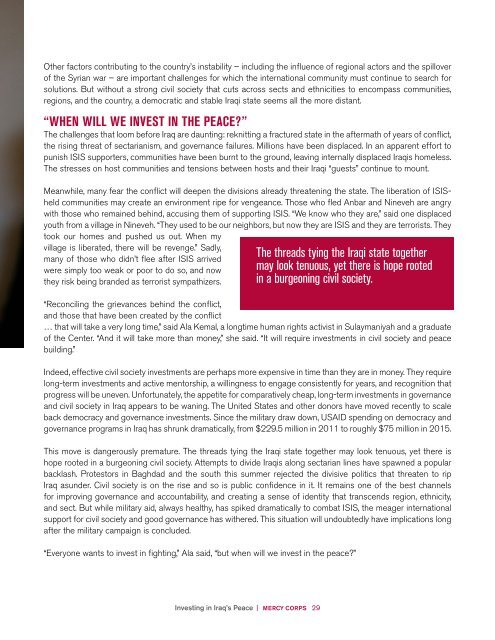INVESTING IN IRAQ’S PEACE
Investing%20in%20Iraqs%20Peace_Final%20Report
Investing%20in%20Iraqs%20Peace_Final%20Report
You also want an ePaper? Increase the reach of your titles
YUMPU automatically turns print PDFs into web optimized ePapers that Google loves.
Other factors contributing to the country’s instability – including the influence of regional actors and the spillover<br />
of the Syrian war – are important challenges for which the international community must continue to search for<br />
solutions. But without a strong civil society that cuts across sects and ethnicities to encompass communities,<br />
regions, and the country, a democratic and stable Iraqi state seems all the more distant.<br />
“WHEN WILL WE <strong>IN</strong>VEST <strong>IN</strong> THE <strong>PEACE</strong>?”<br />
The challenges that loom before Iraq are daunting: reknitting a fractured state in the aftermath of years of conflict,<br />
the rising threat of sectarianism, and governance failures. Millions have been displaced. In an apparent effort to<br />
punish ISIS supporters, communities have been burnt to the ground, leaving internally displaced Iraqis homeless.<br />
The stresses on host communities and tensions between hosts and their Iraqi “guests” continue to mount.<br />
Meanwhile, many fear the conflict will deepen the divisions already threatening the state. The liberation of ISISheld<br />
communities may create an environment ripe for vengeance. Those who fled Anbar and Nineveh are angry<br />
with those who remained behind, accusing them of supporting ISIS. “We know who they are,” said one displaced<br />
youth from a village in Nineveh. “They used to be our neighbors, but now they are ISIS and they are terrorists. They<br />
took our homes and pushed us out. When my<br />
village is liberated, there will be revenge.” Sadly,<br />
many of those who didn’t flee after ISIS arrived<br />
were simply too weak or poor to do so, and now<br />
they risk being branded as terrorist sympathizers.<br />
The threads tying the Iraqi state together<br />
may look tenuous, yet there is hope rooted<br />
in a burgeoning civil society.<br />
“Reconciling the grievances behind the conflict,<br />
and those that have been created by the conflict<br />
… that will take a very long time,” said Ala Kemal, a longtime human rights activist in Sulaymaniyah and a graduate<br />
of the Center. “And it will take more than money,” she said. “It will require investments in civil society and peace<br />
building.”<br />
Indeed, effective civil society investments are perhaps more expensive in time than they are in money. They require<br />
long-term investments and active mentorship, a willingness to engage consistently for years, and recognition that<br />
progress will be uneven. Unfortunately, the appetite for comparatively cheap, long-term investments in governance<br />
and civil society in Iraq appears to be waning. The United States and other donors have moved recently to scale<br />
back democracy and governance investments. Since the military draw down, USAID spending on democracy and<br />
governance programs in Iraq has shrunk dramatically, from $229.5 million in 2011 to roughly $75 million in 2015.<br />
This move is dangerously premature. The threads tying the Iraqi state together may look tenuous, yet there is<br />
hope rooted in a burgeoning civil society. Attempts to divide Iraqis along sectarian lines have spawned a popular<br />
backlash. Protestors in Baghdad and the south this summer rejected the divisive politics that threaten to rip<br />
Iraq asunder. Civil society is on the rise and so is public confidence in it. It remains one of the best channels<br />
for improving governance and accountability, and creating a sense of identity that transcends region, ethnicity,<br />
and sect. But while military aid, always healthy, has spiked dramatically to combat ISIS, the meager international<br />
support for civil society and good governance has withered. This situation will undoubtedly have implications long<br />
after the military campaign is concluded.<br />
“Everyone wants to invest in fighting,” Ala said, “but when will we invest in the peace?”<br />
Investing in Iraq’s Peace | MERCY CORPS 29


